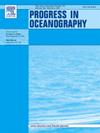急流向极地迁移导致海洋初级产量减少
IF 3.6
3区 地球科学
Q1 OCEANOGRAPHY
引用次数: 0
摘要
急流是强大的对流层上层风,对天气和气候有显著影响。由于人为气候变化改变了温度梯度,预计副热带JS将向极地移动,这可能对中纬度地球系统产生不可预见的后果。本文首次论证了北半球副热带热带气旋稳定向极地迁移对海洋初级生产力(MPP)的影响。利用20多年的数据(2000-2023),我们建立了地中海西北部JS纬度位置与MPP变化之间的直接关系。在研究期间观测到的向北迁移约75公里与叶绿素浓度的持续下降相一致,减少了40%,每年减少幅度高达- 5%。这是由于JS位置稳定的向北季节性移动,导致北风应力和Ekman泵的变化,从而减少了上升流的发生和强度。虽然JS位置对MPP的主要影响是季节性的,但我们证明其影响也延伸到非季节性成分。与其他将JS变化与短期风应力变化和孤立上升流事件联系起来的研究不同,我们的研究结果强调了对MPP的长期影响。我们的研究结果表明,JS动力学是地中海西北部MPP变化的主要驱动因素,并指向全球其他海洋区域的类似情况。MPP减少的级联效应有可能对海洋生态系统和资源产生重大影响,对渔业和碳循环产生更广泛的影响。本文章由计算机程序翻译,如有差异,请以英文原文为准。

Jet stream poleward migration leads to marine primary production decrease
Jet Streams (JS) are powerful upper-tropospheric winds that significantly influence weather and climate. As anthropogenic climate change alters temperature gradients, subtropical JS are expected to shift poleward, which can have unforeseen consequences on midlatitude Earth systems. Here, we demonstrate, for the first time, the impact of the steady poleward migration of the Northern Hemisphere subtropical JS on Marine Primary Production (MPP). Using over two decades of data (2000–2023), we establish a direct relationship between the JS latitudinal position and MPP variability in the Northwestern Mediterranean Sea. The observed northward migration of approximately 75 km over the study period aligns with a consistent decline in chlorophyll concentrations, representing a 40 % reduction, with rates reaching up to −5% per year. This is attributed to the steady northward seasonal shift of the JS position, which drives changes in northern wind-stress and Ekman pumping, subsequently reducing upwelling occurrence and intensity. While the primary influence of JS position on MPP is seasonal, we demonstrate that its impact extends to non-seasonal components as well. Unlike other studies linking JS shifts to short-term wind stress variations and isolated upwelling events, our findings highlight a long-term impact on MPP. Our findings suggest that JS dynamics is a dominant driver of MPP variability in the Northwestern Mediterranean Sea and point to equivalent situations in other marine regions worldwide. The cascading effects of reduced MPP have the potential to significantly impact marine ecosystems and resources, with broader implications for fisheries and the carbon cycle.
求助全文
通过发布文献求助,成功后即可免费获取论文全文。
去求助
来源期刊

Progress in Oceanography
地学-海洋学
CiteScore
7.20
自引率
4.90%
发文量
138
审稿时长
3 months
期刊介绍:
Progress in Oceanography publishes the longer, more comprehensive papers that most oceanographers feel are necessary, on occasion, to do justice to their work. Contributions are generally either a review of an aspect of oceanography or a treatise on an expanding oceanographic subject. The articles cover the entire spectrum of disciplines within the science of oceanography. Occasionally volumes are devoted to collections of papers and conference proceedings of exceptional interest. Essential reading for all oceanographers.
 求助内容:
求助内容: 应助结果提醒方式:
应助结果提醒方式:


